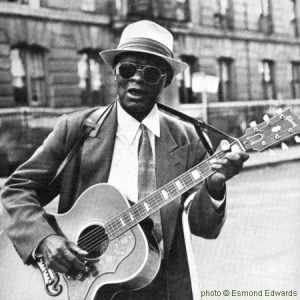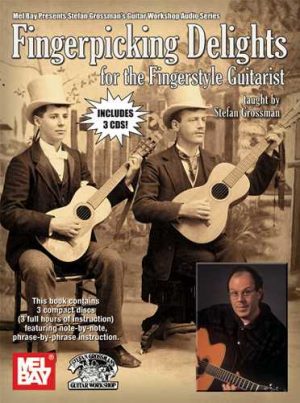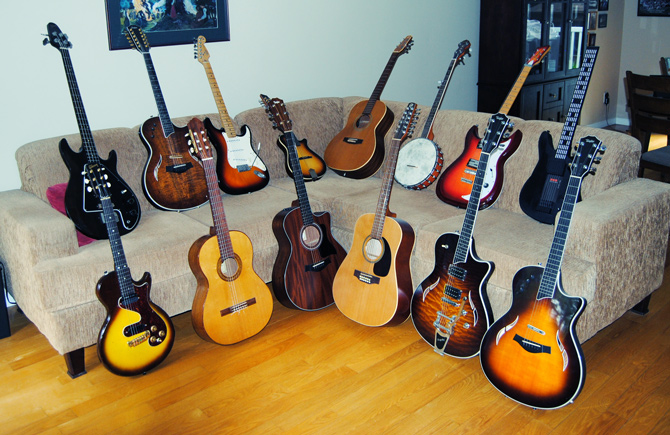Gary Davis was born in Laurens County in the Piedmont region of South Carolina. Of the eight children his mother bore, he was one of only two who survived to adulthood. He became blind as an infant after improper treatment of an eye condition. He recalled being poorly treated by his mother and that his father placed him in the care of his paternal grandmother. His father left during Gary’s childhood and was gunned down by authorities in Alabama after an alleged murder incident.
Davis had exhibited an interest in music at an early age and built a guitar from a pie pan around the age of seven. He taught himself to play guitar, banjo, and harmonica and began playing local dances for the white folk while still a child.
In 1937 Davis married Annie Bell Wright, a woman as deeply spiritual as himself, and she looked after him devotedly until his death. In 1940, when the blues was losing popularity, they moved to Mamaroneck, New York, where Annie had found work as a housekeeper. Later that same year they moved to Harlem, where they lived for the next 18 years and where Davis became a minister of the Missionary Baptist Connection Church. He continued busking and preaching in New York, often referred to as the “Harlem Street Singer.” For a time he stopped playing blues music altogether in favour of gospel and old time songs. He also taught guitar, charging $5 for lessons that could last all day and into the night. As he became better known among folk aficionados, he made recordings for various companies, consenting little by little to revive some of his secular repertoire for the benefit of his white admirers. Among some of his students were Stefan Grossman (founder of the Guitar Workshop), Steve Katz (of Blood, Sweat and Tears), Bob Weir (of The Grateful Dead) and Dave Van Ronk. In a performance at the Gaslight Cafe in Manhattan, Davis famously referred to his disciples by saying “I have no children, but I have sons.”
In particular, the work of Stephan Grossman must be singled out. He met Gary Davis when he was only 15 years old, his dad driving him to the Bronx to take guitar lessons. Grossman led Davis to coffee shops, bar mitzvahs, dances and churches, where his wide range of styles suited any audience. Grossman often acted as Davis’ aide when deaing with municipal requirements, filling out forms and other paperwork impeded by his blindness.
As a teenager, learning was for me a process of hearing the song and trying to find the right notes on my guitar. At that time, there were a few recordings of masters like Gary Davis or Mississippi John Hurt but only on vinyl. Tape machines were rare, bulky, awkward and expensive. I remember being frustrated trying to learn to play from vinyl recordings – since my guitar was only tuned “by ear,” I struggled finding the right pitch and the notes played by those great guitarists of the time flew at me from everywhere. Then there were innovative guitarists like Bert Jansch who played the guitar in exotic tunings and I couldn’t find his notes on my guitar! I was saved when I saw an ad at the back of a comic book, telling me to write in to the Stefan Grossman Guitar Workshop in New York City for a free catalog of guitar instruction lessons. For me, New York City might as well have been Mars but I wrote in and it worked! I started collecting Grossman’s instruction books, everything written out in tablature, a pictorial representation of the six guitar strings complete with numbers on the string lines to indicate at which fret to play each string. For a kid like me, who could never afford real music lessons, tablature was a godsend. Stefan Grossman’s Guitar Workshop, and Grossman himself, are responsible for nurturing the aspirations of countless guitarists who wanted to learn the fingerpicking style. The Workshop is still active and now features many priceless video recordings of the great masters from the past.My rendition of “Death Don’t Have No Mercy” is dedicated to the memory of my sister Marielle, who passed away last year, and of my brother Bob, who left us just this month.
Richard Séguin – voice and acoustic guitar
To hear the song, click on the title below
Copyright Disclaimer under Section 107 of the Copyright Act 1976 : allowance is made for « fair use » for purposes such as criticism, comment, news reporting, teaching, scholarship, education and research.


